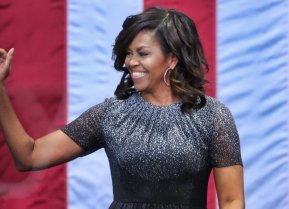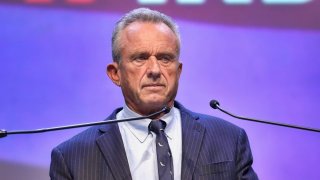Robert F. Kennedy Jr: The Next President of the United States?
Robert F. Kennedy Jr. is not a long-shot candidate for the White House anymore, and the more Americans learn about his campaign, the more obvious that’s going to become.
Robert F. Kennedy Jr. Is No Longer A Long-Shot Candidate - The viral Robert F. Kennedy Jr. ad that aired during this year’s Super Bowl was more than just a frivolous play on the Kennedy name. The ad, which evoked the imagery of John F. Kennedy’s 1960 presidential campaign, was an effective way of exposing millions of older Americans to a campaign that they may not have realized exists, and to remind them of a time they either remember or have a strong affinity for.
The lack of visibility of the Kennedy campaign to older voters is something the candidate and his team understands well. Younger voters know Kennedy from his online podcast appearances and interviews, but older voters rarely see him on television.
“The problem with the baby boomers, I think, is they get their news from MSNBC, Fox and CNN,” Kennedy said during a campaign event in Phoenix, Arizona. “Whereas young people are getting their news from podcasts and other alternative sources.”
It’s a compelling and, frankly, obvious, explanation for the dramatic difference in support his campaign receives from younger and older voters. It also explains why the line “Old enough to know and young enough to do” from the 60s-style Super Bowl ad hit home for so many viewers. It’s apt, and it’s possibly the most powerful line to come out of the Kennedy campaign yet. It doesn’t matter that it’s a borrowed phrase, of course – Make America Great Again wasn’t new when Trump plastered it on baseball caps in 2016, either. It resonates because it’s true, and because most Americans want someone even somewhat younger than Trump and Biden. That’s true for voters of all ages, but Team Kennedy must now build on the enormous support he has among young voters and start to win over his own generation, too.
According to a New York Times/Siena poll conducted across six key battleground states, Kennedy leads with 34% support among voters aged 18 and 29. The same poll put Joe Biden at 30% and Donald Trump at 29% among the same age group.
Leading among young people isn’t enough to win the presidency, of course, but that support is bolstered by his popularity more generally among independents. According to a Quinnipiac survey, Kennedy beats both Biden and Trump with 36% support compared to the two big parties’ 31% and 30% respectively. The same survey also showed Kennedy with an even greater level of support among young people, winning 38% support among voters aged 18 to 34, compared to Biden’s 32% and Trump’s 27%.
Kennedy’s popularity among young people is so substantial that Vanity Fair, an outlet that could reasonably be described as uncompromisingly supportive of the Democratic Party no matter what they do or say, reported in November 2023 that “A ******* Number of Young Swing State Voters Think RFK Jr. Should Be President.”
Not only is Kennedy leading among young people and independents, he’s also the most popular candidate in the race. According to a Gallup poll, Kennedy is the only candidate with a favorability rating of over 50%, reaching 52% in the January 2024 survey. And, according to a poll from ABC News, 34% of Americans see themselves supporting RFK Jr. in November. That’s a win in a three-way race against Biden and Trump.
Curiously, despite the polls being commissioned by mainstream news outlets, the survey data apparently hasn’t reached the desks of most reporters. Kennedy is still frequently described as a “long-shot candidate.” It’s almost as if they don’t want to believe it, or worse, don’t want the American people to believe it. Call me a cynic, but it would explain a lot. Kennedy, as I argue in my book, The Truth Teller, is a bridge between the left and the right who champions ideas and policies that most of America agrees with. On energy, for example, Kennedy promises to beat America’s dependence on fossil fuels – a policy from the left – but suggests we revolutionize American energy by allowing producers to battle it out on a level playing field with zero government subsidies.
On energy and more, Kennedy finds ways to unite Americans who are needlessly divided by two big parties – and the respective media industries behind them that financially depend on perpetuating the partisanship that is destroying America. It explains why, when questioned, committed Democrats describe RFK Jr. as a conservative, and committed Republicans describe him as a liberal.
Kennedy can’t win over the committed partisans, but he can do better among older independents, and he can win over Republicans and Democrats who are accompanied by the significant majority of independents in expressing concern about the state of political factionalism on a national level. According to a Public Agenda and USA TODAY poll, almost three in four Americans believe that it would be beneficial for the country to “reject political hostility and divisiveness and focus more on their common ground.” The poll also found that 93% of Americans consider it important to reduce the country’s current divides.
If there were an ideal political scenario whereby an independent could actually win the presidency, it would be America in 2024. Former President Donald Trump enjoys unwavering support from only a small minority of Americans, and is recognized for his flaws by much of the Republican Party. On the other side, Joe Biden’s support would evaporate if he didn’t have the Democratic Party behind him. Both men, despite the fact that a tiny minority of Americans actually believe in them, behave as though they have been ordained with the power, or the right, to divide America down the middle and force unpopular ideas onto those who don’t support them until they eventually stop resisting. That is a path to uncertainty, conflict, and violence.
Woke extremists side with Biden, and far-right radicals side with Trump. The progressive left campaigns on economic inequality and the far right campaigns on immigration, and never the twain shall meet. By refusing to meet in the middle, extremists on both sides of the aisle are granted undue credibility by voters desperate for moves to be made. The far right doesn’t own the immigration issue, and the ultra-progressive left doesn’t have the blueprint for economic growth required to achieve their dreams of equity.
Kennedy knows that these big issues do not need to be fought separately. He brings together activists from the Marianne Williamson, Tulsi Gabbard, and Donald Trump camps, acting as a pressure valve for a nation on the brink of exploding and focusing on the vast common ground between Republicans and Democrats. Like Daedalus, he flies between the sun and the sea spray, navigating the middle ground – the aurea mediocritas – that will cure this country of its rampant radicalization, extremism, and political factionalism.
Doesn’t it seem all the more sinister that the media, then, continues to call him a long-shot candidate when he offers so much promise for unity at a time of unprecedented vitriol, and when the polls already show him a path to victory?
Robert F. Kennedy Jr. is not a long-shot candidate, and the more Americans learn about his campaign, the more obvious that’s going to become.
About the Author
Jack Buckby is a New York-based author and extremism expert originally from the United Kingdom. His 2020 book Monster Of Their Own Making makes suggestions for dealing with the West’s crisis of political factionalism, and his 2023 book The Truth Teller makes the case for a Kennedy presidency.


